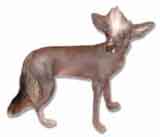Small Dog BreedsInformation About The Chinese Crested Dog Breed |
|
|
The Chinese Crested dog has a delicate and fine-boned body. The breed comes in two types- the hairless and powder puff. The hairless variety has no coat aside from the silky tufts on his head, tail, and feet - which means no hairs on carpet. Unlike all other breeds, he is hairless and has sweat glands on his body. The powder puff variety has a medium-length, silky, soft, and shedding coat. Although still very apparent, the powder puffs have been excluded from selective breeding over a period of years. Many believe that the powder puffs are nature's way of keeping these hairless breeds warm. This dog is handy sized, clean, odorless, and is great a pet dog as well as a show dog. He is intelligent, alert, inquisitive, courageous, gentle, devoted to his owners, and gets along well with children. He is sometimes timid with strangers and other dogs. Training should be precise and patient. Socialization is crucial from puppy hood to help boost the confidence of this sensitive toy breed. This dog can be difficult to housebreak and can be noisy at times. Spoiling may result to a pushy and nippy dog that lacks confidence. He seldom requires veterinary care and is a free whelper. He has the ability to grip his paws in a charming and almost human fashion. This breed is allergic to wool. Size: The Chinese Crest stands between 11-13in at the shoulder and weighs between 6-10lb. History and origin: Though the age of this breed is not clear, it is believed to have been developed by the Chinese in the 17 th century from the bloodlines of African Hairless dogs. Up until 1966, an elderly lady in the United States, Mrs. Ruth Harris owned the only examples of this breed in the world. She introduced 4 of these to the United Kingdom. Nowadays, the Chinese Crested is becoming more and more popular and is being included in an increasing number of dog shows. The breed is also recognized by the British Kennel Club. Feeding: Recommended feeding for this breed is ½ -3/4 can of high-quality brand dog food (13.3oz size) or the fresh meat equivalent with a cupful of small dog biscuits. You may want to keep a bowl of biscuits handy so that the dog may help himself when puckish, but remove them if you think he is becoming overweight. This breed lack premolar teeth, and thus it is inadvisable to give them bones. Exercise: An apartment is fine for this small breed provided he gets a brisk walk or 2 each day. Grooming: This breed requires frequent bathing. The skin should be regularly rubbed with baby oil to prevent cracking and to keep it smooth to the touch. Extra care must be taken to prevent sunburn and to maintain the skin free of blackheads to which they are prone to during adolescence.Back to the Small Dog Breed page
| |
|
Related News About Dogs ' ); // get rid of newsfeed display by carp CarpConf('poweredby',''); CarpCacheShow('http://www.small-dog-info.com/support-files/rss.xml'); ?>
|
|
|
|
|
|
Copyright © 2006-2007 dogguidance.com |


